- Home
- Joel C. Rosenberg
The Copper Scroll Page 8
The Copper Scroll Read online
Page 8
“Don’t say that, Dr. Mordechai,” Bennett pleaded, his voice wavering. “You’re going to pull through this.”
“No. My time has come. The Lord blessed me with a long and full life, but now I’m ready . . . to meet my God face-to-face, and to see my beautiful Yael once more. . . . And I tell you both, I cannot think of anything I want more.”
“But we need you here,” said Bennett. “There’s still so much we don’t know, so much to be done.”
“No, Jonathan,” Mordechai said softly. “This is your time. Make the most of it.”
“What if I’m not ready?” Bennett asked.
But Mordechai would have none of it. “You are, and so is Erin. But be on guard. A new evil is rising, more deadly than anything that has ever come before. I should have seen it coming, but I was so busy. I let my guard down, and then . . . ”
There was a long pause. The old man’s eyes were at half-mast. His strength was quickly fading. “You both must promise me something,” he said at last.
“Anything,” said Erin.
“You must find . . . them . . . ”
“Who, Dr. Mordechai?”
“. . . and stop . . . them . . . ”
His hands were trembling. His pulse was becoming erratic.
“Who, Dr. Mordechai?” Bennett pressed. “Who did this to you?”
“. . . before they . . . ”
“Before they what?”
But Mordechai’s eyes barely registered a response. He seemed to be drifting away, and there was another long, wrenching silence. Bennett saw tears streaming down Erin’s face as she covered her mouth to keep from being heard. Then he looked back at the man who had been his spiritual father and put his ear close to his mouth. He thought Mordechai said something like “start with,” but the next word was barely audible. Break? Brock? Broke? Mordechai was mumbling the same word over and over, but Bennett couldn’t make sense of it.
Then suddenly, it was as though Mordechai had gained a second wind, if only for a moment. “I should have liked to have met my Lord in the clouds,” he said finally.
And then he closed his eyes and breathed his last.
An alarm on the heart monitor went off. Then the ventilator alarm went off as well. Mordechai was flatlining. Doctors and nurses burst into the room, forcing Bennett and Erin to move aside. A nurse plunged a needle into Mordechai’s chest. Another pulled electric shock paddles off the wall. A team of specialists raced through a series of emergency procedures, heroically battling to save a man most of them believed was a traitor. But it was too late. There was nothing they or anyone else could do.
Mordechai’s heart had stopped, and at last he was home.
15
TUESDAY, JANUARY 13 – 5:47 p.m. – JERUSALEM, ISRAEL
The blood in Bennett’s face began to drain away.
The colors in the room faded. The room spun. His mouth was dry. A shiver shot through his body. An aching, throbbing pain coursed through his veins and through his soul. He felt the warmth of Erin’s hand, and for a moment, at least, it seemed to anchor him back to reality.
He blinked hard and turned to her as she began to sob, her body heaving, gasping for air amid her cries. He pulled her to him and wrapped his arms around her, and she buried her face in his chest and refused to let go. Soon his shirt was soaked through. But for some reason he couldn’t join her. He couldn’t cry. Not yet. It was all too sudden. He still didn’t believe it was true.
In the hallway, Jon could hear muffled voices. Someone was telling the prime minister and then Ken Costello the news. He couldn’t hear the words, but he could feel their effect. The shock of Mordechai’s death was spreading through the ICU, as it would soon spread through the country and the world.
A nurse pulled a sheet up over Mordechai’s head while another filled out a clipboard of paperwork. They said nothing. They were professionals, and they were respectful of the dead. But Jon couldn’t help wondering what they thought of Eliezer Mordechai. Could they ever believe what he’d believed?
A moment later, Costello stepped into the room to pay his last respects. Then he gave both Jon and Erin a quiet hug and stepped back into the hallway, making way for Prime Minister Doron, who came in next, without his security detail.
“He was a good man,” Doron said after a long, awkward pause.
“The best,” said Bennett.
“He had such certainty about life and such a peace about dying,” Doron observed as he stared at the shrouded body of his friend of nearly forty years. “I have to admit, I envied him.”
Bennett was surprised to hear Doron say it. But in his grief, at least for now, he couldn’t find the words to respond.
A Shin Bet agent popped her head into the room. “Mr. Prime Minister,” she said quietly.
“Yes?”
“I’m afraid we need to clear this room for a few minutes.”
“Yes, yes, of course,” Doron said, noticing two orderlies waiting in the hallway, no doubt ready to take Mordechai’s body to the morgue.
With his arms still around her, Bennett led his grieving bride out of the room and followed Doron, Costello, and several aides and bodyguards down the hallway and out of the orderlies’ way.
“Jon, I know this is a very difficult time, but I wonder if I could speak with you for a moment,” the prime minister whispered. “It’s about Eli. I think it might shed some light on what happened.”
Bennett hesitated, not wanting to leave Erin alone. But she wiped away her tears with the handkerchief he’d given her and motioned for him to go. “I’ll be okay for a few minutes,” she sniffled.
“You sure?” he whispered back.
“Don’t be long.”
“I won’t.”
Bennett caught Costello’s eye, and Costello immediately came over and guided Erin to a lounge chair, sat her down, and offered to get her some hot tea, which she gratefully accepted.
Doron, meanwhile, motioned to his chief of staff and press secretary. “Would you both excuse us for a moment?”
The men took their leave, and with several security men in tow, the prime minister led Bennett to the stairwell and up to the roof.
* * *
Mustafa Al-Hassani needed some fresh air.
He stepped out onto the balcony of his presidential palace, built by Saddam and now his very own, and felt the cool evening breezes coming off the desert as he listened to the steady drilling of construction crews and saw the great cranes in motion as far as the eye could see. A moment later, his consigliere, Khalid Tariq, joined him.
“You were right, Your Excellency,” said Tariq. “They were more pliable than I had expected.”
“You expected more resistance?” asked Al-Hassani.
“I expected some resistance.”
“Never underestimate the power of desperation, Khalid. Remember, these are men without homes, without hope, without the families and treasures they have always loved. They are adrift. They have no leaders, no direction, no sense of destiny. Like their great-great-grandfathers, they are, once again, nomads, wandering in the desert, and we are the shelter amid the storms.”
“You were right about the Temple as well,” Tariq noted.
“Always remember,” Al-Hassani said, lighting his pipe, his white robes rippling in the desert breezes, “these men’s faith in Islam may have shattered, but not their passion for Jerusalem. Jerusalem predates Islam. Indeed, it transcends Islam. Jerusalem has always been the temptress that draws men’s souls. She is the jewel for which every ruler lusts. Men spilled their blood to possess her long before Mohammed was born, my friend. And with the right leadership, they will do so again. Our new alliance depends upon it.”
“What if Operation Black Box fails?” asked Tariq.
“It cannot be allowed to fail, Khalid,” Al-Hassani said emphatically. “You must make sure of that. If we are to rebuild the empire of our fathers, we must stop the Jews—whatever it takes and whatever the cost. And we must do so carefully, without a
ny of our actions ever being traced back to us. Did you tell me that pressure on Doron to build the Temple is growing?”
“I’m afraid so, Your Excellency,” Tariq replied. “The Jerusalem Post has a new poll out just this morning—78 percent of Israelis want to see construction begin on the Temple within the next six months. That’s up nine points since the first of the year. What’s more, Israel’s chief rabbi is quoted as saying he wants the government to put up all the funds.”
“What more proof do you need?” asked Al-Hassani. “It no longer matters how much pressure the White House puts on the Israelis. Or whether the bureaucrats in Brussels stamp their feet. Or whether the U.N. decides to pass a resolution warning Israel not to move forward. All of that is irrelevant. The simple fact is, if Doron refuses to build the Temple, his government could very well collapse. Which means we are running out of time, Khalid. We must stop the Jews from moving forward before it’s too late.”
16
TUESDAY, JANUARY 13 – 5:58 p.m. – JERUSALEM, ISRAEL
The night air was damp and chilly.
Bennett stepped onto the roof of the hospital and stared into the distance at the scorched surface of the Temple Mount. No matter how many times he’d seen the now-barren sacred site—wiped clean, as it were, by the great firestorm—it was still surreal.
The Dome of the Rock had been standing there day and night, rain or shine, since the seventh century AD. The Al-Aksa Mosque had been there in one form or another since early in the eighth century. Both had been modified, redesigned, and reconstructed several times over the years, to be sure. But they had been landmarks of history, emblems of culture, centers of learning and worship for Muslims nearly since the founding of Islam. Now they were no more. It was a fact the implications of which Bennett had not yet fully processed, given all else that had happened in the world and in his life.
“There is something you should know, Jonathan,” the prime minister began, jarring Bennett back into the moment. “I know Avi Zadok shared with you several of the theories being bandied about in the press about who killed Eli and why. But there may be another explanation for why Eli died. Come, take a walk with me.”
The concrete beneath their feet was wet from a late-afternoon shower, and as they walked they stepped carefully around the puddles.
“Last November,” the prime minister began, “not long after the earthquake and the firestorm, I quietly asked Mordechai to come to my office. We talked about ‘The Ezekiel Option,’ about why he’d written it and about what he thought was coming next. As you can imagine, he did his best to convert—er, persuade—me to become a follower of Jesus. He warned me time was running short, that the Scriptures said ‘now is the day of salvation,’ and I asked him what he believed was next on the prophetic calendar.”
“What did he say?” asked Bennett.
“He talked a lot about the Rapture—which, if I understand correctly, is when all of the followers of Jesus around the world disappear in the blink of an eye and are caught up in heaven to be with God forever.”
Bennett nodded.
“Well, he gave me quite an earful on that.”
“And you didn’t buy it?” asked Bennett.
“Please, Jonathan. I’m the prime minister of Israel, for crying out loud. Eli’s prescience was uncanny. I will grant you that. But just because he was right about Russia and Iran doesn’t prove ipso facto that Jesus is the Messiah. Believe me, I’ve read Ezekiel 38 and 39. They don’t say anything about Jesus. They’re not in the New Testament. They’re Jewish prophecies, written by a Hebrew prophet. While Eli loved to point out how many millions have become followers of Christ in the last few months, I would always remind him that we’ve also seen an unprecedented resurgence in Jews all over the world attending synagogue, buying Hebrew Bibles, wearing tefillin, enrolling their children in Hebrew school, and so on. The fact is, Jews are turning back to Judaism in record numbers, Jonathan. And why is that? Because they have seen the God of Israel—the God of Abraham, Isaac, and Jacob—show Himself in an amazing way.”
“All true,” Bennett conceded. “But I’m not sure I understand your point.”
“My point,” said Doron, “is that Christians and Jews have very different interpretations of what has just happened, and very different understandings of what is going to happen next. But Eli did say there’s at least one thing that all of the Jewish and Christian prophets and teachers—ancient and modern—agree upon, and that is this: the next major prophetic event that will occur is the building of the Third Jewish Temple in Jerusalem. He pointed out that Ezekiel chapters 40 through 48 are all about the rebuilding of the Temple, right after the War of Gog and Magog. And he warned me how explosive the issue of the Temple would be. Specifically, he urged me to be on guard against a new evil that will rise and begin targeting anyone who tries to bring the Temple to completion.”
“He used that phrase, a new evil?” Bennett asked.
“Yes, why?” asked Doron.
“Because he used that same phrase with Erin and me, just before he died.”
“What do you mean?”
“He said, ‘But be on guard, my children, for a new evil is rising, more deadly than anything that has ever come before.’”
“Yes, yes, that’s what he said to me,” said Doron.
“And then,” Bennett added, “he told us to ‘stop them before . . . ’”
“Before what?”
“I don’t know. He passed away before he could explain.”
“This may all be my fault,” Doron said suddenly, almost in a whisper.
“Why?” asked Bennett. “What do you mean?”
“When Eli told me his theories about the Temple and about this ‘new evil’ rising, I asked him to do one last mission for me. And now, I fear, it may have cost him his life.”
Bennett’s stomach tightened. “What kind of mission?”
Doron stopped and looked into Bennett’s eyes, then turned away and leaned against the damp, cold metal railing along the edge of the roof. For a few moments he said nothing, just stared out over the twinkling lights of the Old City, and it struck Bennett that the prime minister was measuring his response carefully.
“I asked Eli to do what he did best,” Doron began. “To think around corners, look over the horizon. I asked him to help me identify the forces behind this ‘new evil’ and how they might try to hit us when construction began.”
“Construction?” asked Bennett. “Of what?”
Doron stared at him. “The Temple, of course.”
Bennett was stunned. “You’re actually going to let the Orthodox build the Third Temple?”
“Of course not,” said Doron. “The government will take the lead.”
“You’re joking,” said Bennett.
But Doron shook his head. “I’ve already pulled together a team of religious scholars, historians, archeologists, architects, artists, engineers—everyone we’ll need. It’s all been hush-hush. They’ve all signed strict nondisclosure forms. I should have final blueprints on my desk by the end of next week. The funds are already set aside. They’ve been part of the military budget for years. And barring anything unforeseen, we’ll start construction when the winter rains stop, probably around March first.”
In more than three years of peace talks between the Israelis, the Palestinians, and the Arab world, Bennett had never heard anything like this. To the contrary, the Israeli government had always taken extraordinary measures to protect the Dome of the Rock and the Al-Aksa Mosque from attack. They had long feared that any change in the status quo—especially an attack by an ultra-Orthodox Jewish extremist group—could unleash the wrath of a billion Muslims against the tiny State of Israel and instantly obliterate any hope of peace. And rightly so. Ariel Sharon had provoked three years of Palestinian riots and terrorist attacks just by taking a stroll across the Temple Mount in September of 2000. One could only imagine what a ground-breaking ceremony for a Jewish Temple would unleash.
17
TUESDAY, JANUARY 13 – 6:14 p.m. – JERUSALEM, ISRAEL
Bennett couldn’t believe what he was hearing.
“You’re not going to let the Muslims rebuild their holy sites?” he asked.
“What Muslims?” asked Doron. “Eli said it himself; Islam is finished.”
“Actually, Mr. Prime Minister, that’s not what he said. He said Ezekiel’s War would be the ‘end of radical Islam as we know it.’ He was talking about the end of the jihadists. But there are still hundreds of millions of Muslims out there. They may be in a state of shock and disarray, but they still believe the Temple Mount is theirs, and this could be just the thing that unifies them and mobilizes them against you. Is that really what you want?”
“What are you talking about?” asked Doron. “I thought you and Eli were on the same page on all this. He was very clear. After the War of Gog and Magog would come the building of the Temple, and then the coming of the Messiah. Which means the sooner we get it done, the sooner we’ll know who’s right—you Christians or we Jews.”
“Look,” said Bennett, “Eli was the theologian, not me. I’m just telling you as a friend and a political ally that if you start building unilaterally, you’re going to face international condemnation. You’re not going to get a peace treaty with the Palestinians. You’re not going to get a peace deal with Iraq or Syria or anyone else in the Arab world. Everything we’ve all worked for all these years will go up in flames.”
“I beg to differ, Jonathan,” Doron replied, pacing around the roof again. “Really, think about it. Who is going to stop us? All of our major enemies are gone. The world needs our oil. We’re about to see the greatest era of peace and prosperity in the history of the Middle East. As soon as cleanup operations in Jordan, Lebanon, and Syria are completed, we will witness an unprecedented wave of tourism to the Holy Land, the likes of which no one has ever dreamed. We’re already planning for it—new airports, new roads, new hotels, new theaters and convention centers, all financed by the petrodollars that are pouring in right now. The Third Temple will be the main attraction, for Christians and Jews alike. For everyone, really. And that’s just the beginning.”

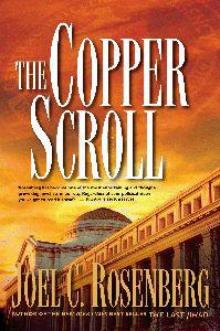 The Copper Scroll
The Copper Scroll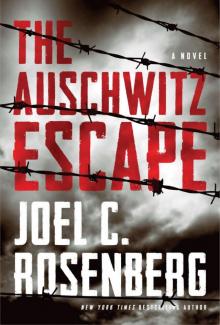 The Auschwitz Escape
The Auschwitz Escape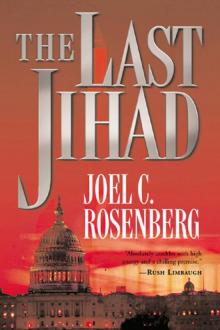 The Last Jihad
The Last Jihad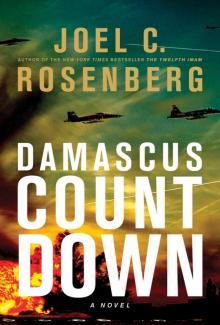 Damascus Countdown
Damascus Countdown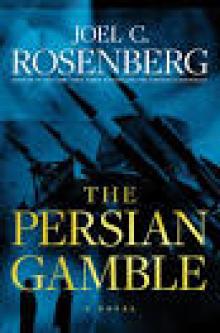 The Persian Gamble
The Persian Gamble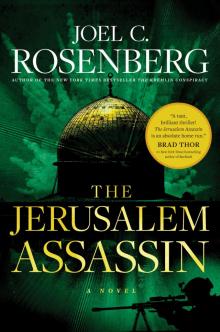 The Jerusalem Assassin
The Jerusalem Assassin Dead Heat
Dead Heat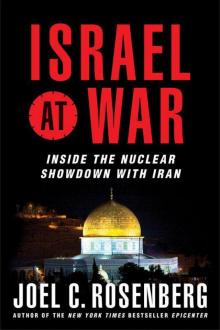 Israel at War: Inside the Nuclear Showdown With Iran
Israel at War: Inside the Nuclear Showdown With Iran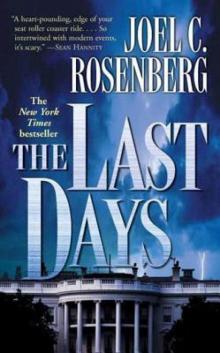 The Last Days
The Last Days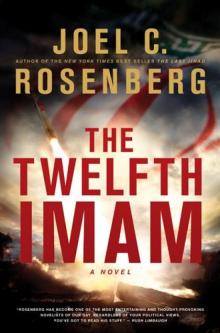 The Twelfth Imam
The Twelfth Imam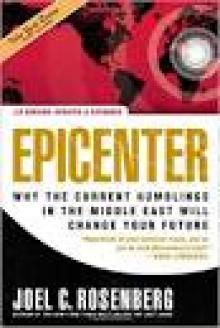 Epicenter 2.0
Epicenter 2.0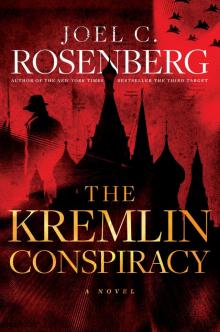 The Kremlin Conspiracy
The Kremlin Conspiracy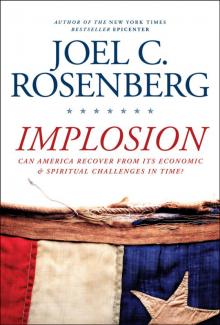 Implosion: Can America Recover From Its Economic and Spiritual Challenges in Time?
Implosion: Can America Recover From Its Economic and Spiritual Challenges in Time?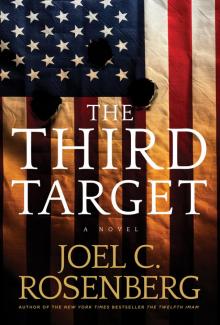 The Third Target: A J. B. Collins Novel
The Third Target: A J. B. Collins Novel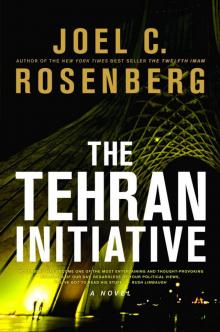 The Tehran Initiative
The Tehran Initiative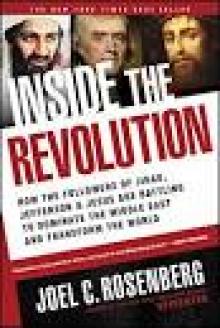 Inside the Revolution
Inside the Revolution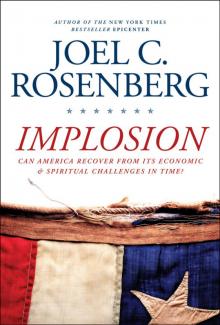 Implosion
Implosion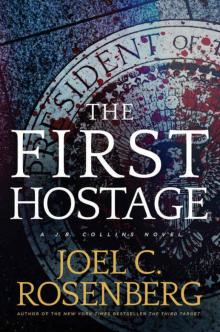 The First Hostage: A J. B. Collins Novel
The First Hostage: A J. B. Collins Novel